March Theater Guide: Mostly Modern
- Like
- Digg
- Del
- Tumblr
- VKontakte
- Buffer
- Love This
- Odnoklassniki
- Meneame
- Blogger
- Amazon
- Yahoo Mail
- Gmail
- AOL
- Newsvine
- HackerNews
- Evernote
- MySpace
- Mail.ru
- Viadeo
- Line
- Comments
- Yummly
- SMS
- Viber
- Telegram
- Subscribe
- Skype
- Facebook Messenger
- Kakao
- LiveJournal
- Yammer
- Edgar
- Fintel
- Mix
- Instapaper
- Copy Link
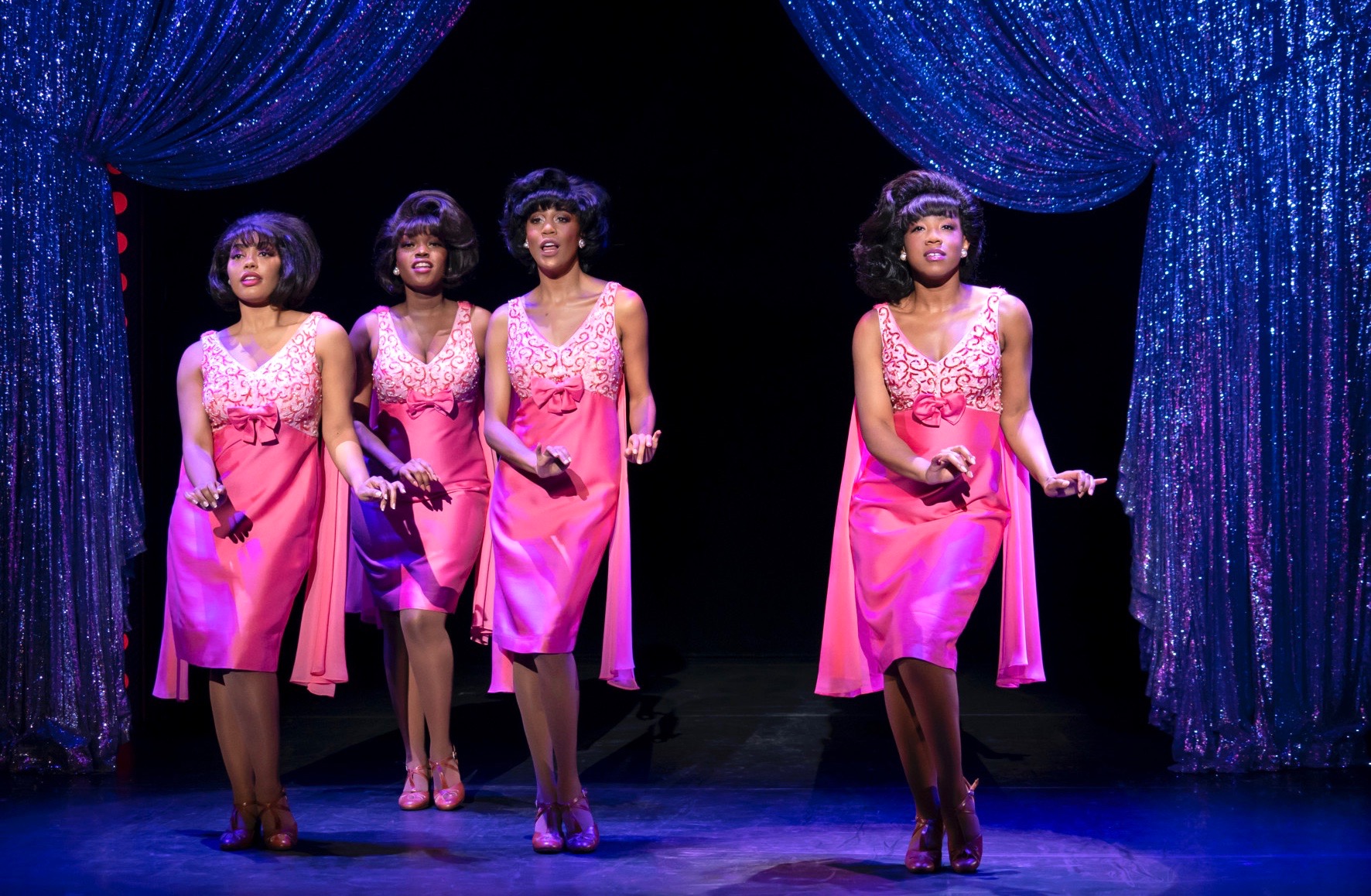
Throwback goes only about as far back as the 1960s in the largely modern-to-contemporary lineup of shows in Pittsburgh this month. Pictured here are the actors emulating The Shirelles in ‘Beautiful: The Carole King Musical.’ (Photo: Joan Marcus)
Some Pittsburgh theater fans might look at the schedule of productions for March and say “What, no Shakespeare?” Truly he is absent this month, but the slate is rich and varied, consisting mostly of shows from the 20th century till now. Serious themes predominate and there is an abundance of works by or about women.
Two coming-of-age stories are included: the Tony-winning, content-advisory musical Spring Awakening and a stage version of Madeleine L’Engle’s A Wrinkle in Time. Dominique Morisseau’s Paradise Blue is a jazz-infused drama about a not-so-jazzy time for African Americans in Detroit. Katie Mack’s Grieve Hard, described as “an interactive performance with death,” offers a walk on the dark side. Beautiful: The Carole King Musical is more of a walk on the bright side.
Pittsburgh Ballet Theatre performs Here + Now, a program of dances by contemporary female choreographers. A different kind of mixed-repertoire show, The End Is Future Is Now, combines adaptations of stories by sci-fi/fantasy writers Octavia E. Butler and Alexis Pauline Gumbs. Beth Corning’s immersive dance/performance piece, Happily Ever After, questions whether today’s women in fact can enjoy the destiny to which the title alludes. And one woman who does not is the title character in Bizet’s Carmen, performed by Pittsburgh Opera.
Productions are previewed below in order of run dates, with Spotlighted shows first, but don’t miss the “Other Shows of Note.”
Shows in the Entertainment Central Spotlight
A WRINKLE IN TIME by Brian Wongchaowart and Wayne Brinda, from Madeleine L’Engle’s book. Prime Stage Theatre. March 4 – 13.
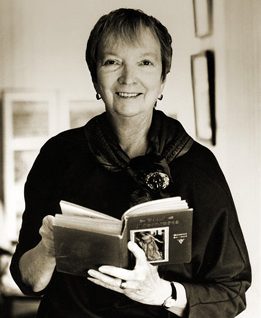
When ‘A Wrinkle in Time’ became controversial among some religious groups for its treatment of spiritual themes, author Madeleine L’Engle met the storm with a smile. (Photo: James Phillips for Square Fish Books, 1989)
In the category of books for young people that adults also love, A Wrinkle in Time ranks high, and now Pittsburghers can see a stage adaptation. Prime Stage Theatre promises a new version of the story, “reimagined for our day.” This is a mind-bending concept if you think about it, since the story involves time travel to begin with. But the universe contains mysteries that are best not over-thought. The play retains the basic plot and key characters of Madeleine L’Engle’s fantasy novel. The young Murry siblings and their friend Calvin, aided by the mysterious Mrs. Whatsit, traverse space-time in search of the Murrys’ missing father, an astrophysicist. A war between good and evil is under way, as forces both spiritual and supernatural collide, giving the youngsters quite a learning experience. The novel is adapted for the stage by playwright Brian Wongchaowart and Wayne Brinda, producing artistic director at Prime Stage. See A Wrinkle in Time at the New Hazlett Theater, 6 Allegheny Square East, North Side.
PARADISE BLUE by Dominique Morisseau. City Theatre. March 12 – April 3.
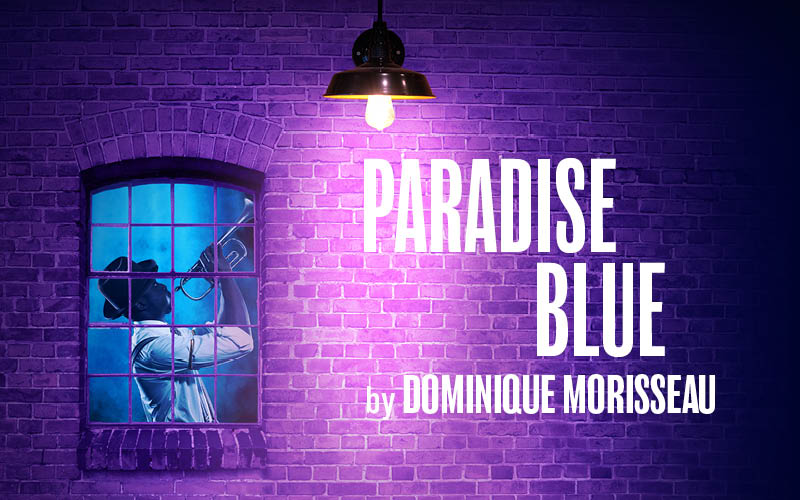 Anyone familiar with the plays in August Wilson’s Pittsburgh Cycle may wish to see one from a similar series, Dominique Morisseau’s Detroit Project. Whereas Wilson wrote 10 plays about the lives and quandaries of African Americans—each set in a different decade of the 20th century—Detroit native Morisseau has written three for her Project, set at various times since World War II. City Theatre is staging the play that comes chronologically first, Paradise Blue. The year is 1949, just as urban redevelopment is starting to put the squeeze on Black neighborhoods and businesses in Detroit. Tensions arise when a jazz musician, who owns a nightclub in the city’s Black Bottom district, faces a decision whether to sell the club and leave behind the people who’ve been in his world for so long. City Theatre’s production features original music composed by present-day jazz artist Theron Brown. The actors are Monteze Freeland, Melva Graham, Wali Jamal, Rafael Jordan, and Eunice Woods. Paradise Blue plays at 1300 Bingham St., South Side.
Anyone familiar with the plays in August Wilson’s Pittsburgh Cycle may wish to see one from a similar series, Dominique Morisseau’s Detroit Project. Whereas Wilson wrote 10 plays about the lives and quandaries of African Americans—each set in a different decade of the 20th century—Detroit native Morisseau has written three for her Project, set at various times since World War II. City Theatre is staging the play that comes chronologically first, Paradise Blue. The year is 1949, just as urban redevelopment is starting to put the squeeze on Black neighborhoods and businesses in Detroit. Tensions arise when a jazz musician, who owns a nightclub in the city’s Black Bottom district, faces a decision whether to sell the club and leave behind the people who’ve been in his world for so long. City Theatre’s production features original music composed by present-day jazz artist Theron Brown. The actors are Monteze Freeland, Melva Graham, Wali Jamal, Rafael Jordan, and Eunice Woods. Paradise Blue plays at 1300 Bingham St., South Side.
GRIEVE HARD (one-person piece) by Katie Mack. Presented by off the WALL productions. March 15 – 16.

Katie Mack premieres ‘Grieve Hard’ at off the WALL. (Photo courtesy of the artist)
Off the WALL productions, a leader in Pittsburgh’s alternative theater scene, is hosting a series of one-person shows by performers from across the country. Katie Mack’s Grieve Hard comes with an implicit trigger warning. This one is about death. But the piece also comes recommended, because New York-based Mack is a singularly dynamic writer and performer. As an actor she has played an astounding variety of parts—from Sally Bowles, the female lead in Cabaret, to the title role in Shakespeare’s Richard III. Her podcast F*cking Sober: The First 90 Days provides amusing and informative listening for anyone interested in recovery. Grieve Hard is a new piece, commissioned by off the WALL. In part, it summons the voice of Mack’s friend Eric Anthamatten, a philosophy professor and writer who died tragically last year. Mack bills Grieve Hard as “an interactive performance with death” that invites audience members “to stare into the abyss, and see if the abyss stares back.” Join Katie Mack at Carnegie Stage, 25 W. Main St., Carnegie.
SPRING AWAKENING (musical) by Duncan Sheik and Steven Sater, from Frank Wedekind’s play. Conservatory Theatre Company at Pittsburgh Playhouse. March 16 – 20.
During the 1890s, while Sigmund Freud was investigating the psychic roots of sexuality (or was it the sexual roots of the psyche?), a German playwright named Frank Wedekind could not find a company willing to produce his play. Spring Awakening was about young teenagers and sex. The subject matter included masturbation, abortion, incest, rape, and teen suicide. Wedekind had written the play to criticize repressive social attitudes, by showing the problems young people can get into when they don’t learn to deal with sex openly and sensibly, but nobody would touch it. For more than a century, Spring Awakening was rarely produced anywhere. Then two Americans, Duncan Sheik and Steven Sater, turned it into a rock musical. This Spring Awakening won eight Tony Awards (including Best Musical) in 2007 and became a global cult hit. The musical, like the original, is set in 1890s Germany and follows Wedekind’s plot closely, amping it up with songs like “The Bitch of Living” and “Totally Fucked.” The onset of spring is a fine time to see Spring Awakening. Point Park University’s Conservatory Theatre Company presents the musical at Pittsburgh Playhouse, 350 Forbes Ave., Downtown.
BEAUTIFUL: THE CAROLE KING MUSICAL by Douglas McGrath. Touring company at Benedum Center. March 18 – 20.

Kennedy Caughell plays Carole King in the traveling production of ‘Beautiful.’ (Photo: Joan Marcus)
Theatrically speaking, a “jukebox musical” is one that uses existing songs while a “bio-musical” tells the story of a real person or persons, and often a show is not both. Example: Mamma Mia! uses the songs of ABBA but does not tell the story of ABBA, since that much ABBA might be too much ABBA. Ah, but Beautiful: The Carole King Musical is both. It traces the renowned pop artist’s rise from hit songwriter to performer of hits that she wrote, co-wrote, or had written for her. Beautiful features more than two dozen Carole King songs, including “So Far Away,” “I Feel the Earth Move,” “One Fine Day” (which she co-wrote for The Chiffons), and more. The show—by Douglas McGrath, with songs by King, Gerry Goffin, Barry Mann, Cynthia Weil, and others—opened on Broadway in 2014 and was nominated for seven Tony Awards, winning two. Now a national touring company brings Beautiful to Pittsburgh. Benedum Center, 237 7th St., Cultural District.
HAPPILY EVER AFTER (modern dance & performance) created by Beth Corning. Corningworks. March 23 – 27.
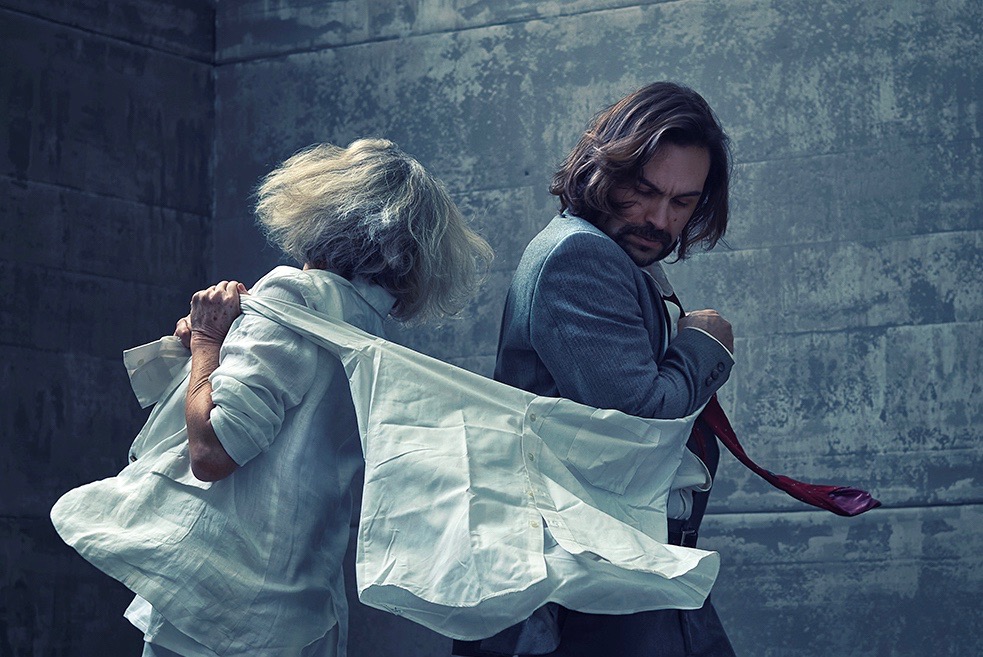
Corningworks has provided this photo from ‘Happily Ever After,’ calling it simply ‘the shirt.’ However the performance is about the persons. (photo: Frank Walsh)
In the late 1960s, when a certain tobacco company launched a new cigarette brand targeted to women, the smokes were marketed with the slogan “You’ve Come a Long Way, Baby.” Of course this invited irate reactions from women, such as “Don’t call me ‘Baby’!”—and, more to the point, “We’ve still got a long way to go.” Which brings us to Pittsburgh-based dance and performance artist Beth Corning. Some years back, Corning staged a feature-length work commenting on domestic abuse and the frequent treatment of women as less than equal persons. Now she presents an update on that one, titled, perhaps ironically, Happily Ever After. Corning describes the piece as “part installation, part performance, part fairytale, part nightmare.” If you have seen productions done under her Corningworks banner, you’ll know to expect the unexpected. Happily Ever After is performed by Corning along with the internationally known dancers Jillian Hollis, Catherine Meredith, Endalyn Taylor Outlaw, and Dionysios Tsaftaridis. Audience size is limited to 50 per performance, so reserve promptly for Happily. It’s in The Space Upstairs, 214 N. Lexington St., Point Breeze North.
HERE + NOW (ballet, program of contemporary short works) by various choreographers. Pittsburgh Ballet Theatre. March 24 – 27.
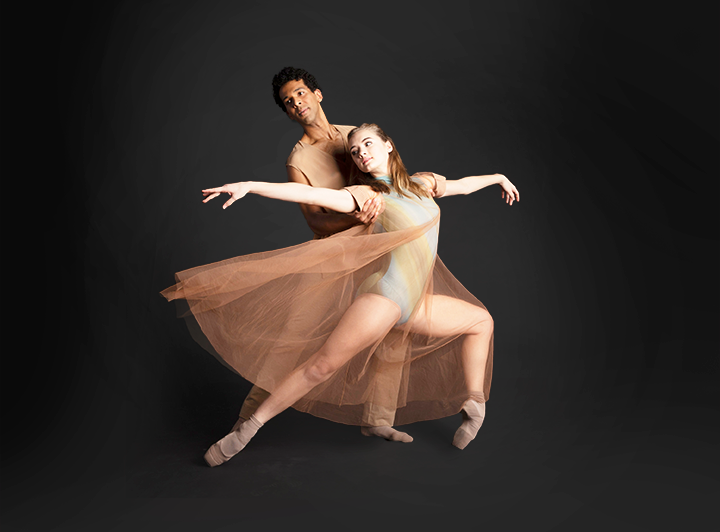
Dancers Corey Bourbonniere and Grace Rookstool glide dreamily in Pittsburgh Ballet’s ‘Here + Now.’ (Photo: Duane Rieder)
Pittsburgh Ballet Theatre partners with the August Wilson African American Cultural Center to present Here + Now, a program of five adventurous dances. All are by contemporary female choreographers. “SKIN + saltwater” was created by Staycee R. Pearl during her recent residency at Pittsburgh Ballet, and is danced to a score by husband Herman Pearl, a.k.a. Soy Sos. Gemma Bond’s “Depuis le Jour” (“Since the Day”) is a pas de deux choreographed to a romantic aria from the Gustave Charpentier opera Louise. Annabelle Lopez Ochoa’s “La Pluie” (“The Rain”) is a sinuous, swirling piece that the Colombian-Belgian choreographer has set to music from Bach’s Goldberg Variations. Helen Pickett, one of this country’s best-known ballet choreographers, created “Three—4,6,8” for Pittsburgh Ballet. The company first performed the piece as part of an outdoor show at Hartwood Acres last summer; it features three male dancers and music by Philip Glass. Here + Now then closes with the premiere of “Bright progressions” by Aszure Barton. See Here + Now in the August Wilson Center’s theater at 980 Liberty Ave., Cultural District.
CARMEN (opera) by Georges Bizet, Henri Meilhac, and Ludovic Halévy. Pittsburgh Opera. March 26 – April 3.
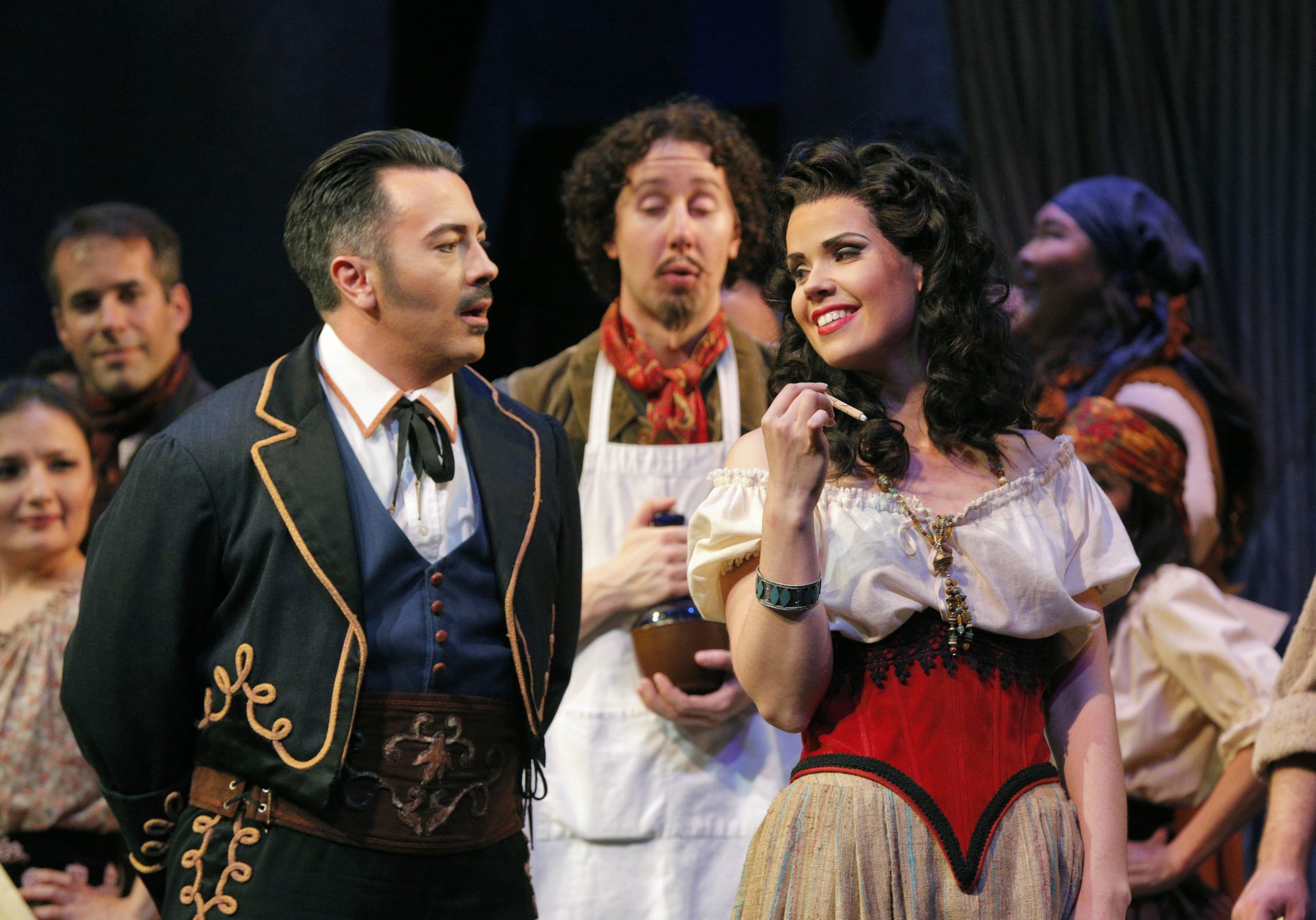
Long ago, ‘Carmen’ was considered too hot to touch, but now the opera is a global favorite. The photo is from a production by Lyric Opera of Kansas City; Pittsburgh Opera is using the same production design.
One of the most famous title characters in opera almost didn’t make it to the stage. Carmen, the antiheroine of Georges Bizet’s 1875 masterpiece, is a knife-wielding factory girl determined to live and love freely. Her drive carries her into territory that is amoral, illegal, and destructive. In Paris opera circles during the 1870s, this constituted a problem. Theater managers fought bitterly over whether a high-art venue should present such a low-life tale. Bizet and his librettists, Henri Meilhac and Ludovic Halévy, were pressed repeatedly to water down the hot stuff in the script. A prominent diva refused the title role. And after Carmen finally opened—to critical scorn and audience indifference—Bizet died suddenly, at the age of 36. He never knew that Parisians would change their opinion of his final opera, or that it would score a spectacular success in Vienna and then become a cherished part of the repertoire worldwide. Pittsburgh Opera presents Carmen with the Latvian mezzo-soprano Zanda Švēde as Carmen, tenor Scott Quinn as the lovesick soldier Don José, and baritone Michael Todd Simpson as the dashing toreador Escamillo. Benedum Center, 237 7th St., Cultural District.
Other Shows of Note
THE END IS FUTURE IS NOW (three adaptations in one theater piece). Carnegie Mellon School of Drama. Now through March 16.
Attention, fans of Afrofuturism, feminist/gay fantasy, and/or sci-fi generally: Carnegie Mellon’s School of Drama has a show for you. Titled The End Is Future Is Now, it is adapted from three acclaimed short stories. Octavia E. Butler’s “Speech Sounds” is set in a future where a global pandemic has rendered most people unable to speak, read, or write. In “The Book of Martha,” also by Butler, God challenges a writer to improve God’s imperfect world. “Evidence,” by Alexis Pauline Gumbs, imagines a look-back from a utopian future to humanity’s dystopian past. The stories are adapted for the stage by Nicole Brewer and Mei Ann Teo. Tickets are free if you reserve online, starting at noon on the business day before each performance. The End Is Future Is Now is in The Philip Chosky Theater on Carnegie Mellon’s campus, 5000 Forbes Ave., Oakland.
DISNEY’S DESCENDANTS: THE MUSICAL, from the TV films. Stage 62. March 4 – 13.
Stage 62, one of the Pittsburgh area’s leading community theater companies, roars into March with a show that’s TYA (theater for young audiences) but might appeal to some grownups. Especially grownups worried about how their kids might turn out. Disney’s Descendants: The Musical is adapted from the Descendants movies on the Disney Channel, and the lead characters are the children of villains from Disney movies past. They include the offspring of Cruella de Vil, Maleficent, Snow White’s Evil Queen, and Aladdin’s Jafar. Can the spawn of these no-goodniks become do-goodniks? See for yourself in the Music Hall at the Andrew Carnegie Free Library, 300 Beechwood Ave., Carnegie.
LIMITS OF THINGS, OR THE MESS (movement theater) by Mark Conway Thompson. Presented by off the WALL productions. March 24 – April 3.
If you haven’t seen Mark Conway Thompson perform, you are missing a world-class experience in physical theater. Calling him a mime would be accurate but only part of the story. Thompson is also an actor, as eloquent in speech as he is in silence; he dances better than most of us; and he’s done all of the above in Europe, South America, and elsewhere. Off the WALL productions now presents Thompson in an original solo show. Limits of Things, or The Mess consists of four brief vignettes and two one-acts. According to the promo material, Thompson “wants to challenge the notions that anything is possible, that all progress is good.” If past results are any indication he’ll probably make quite a case. At off the WALL’s Carnegie Stage, 25 W. Main St., Carnegie.
Mike Vargo, a Pittsburgh-based freelance writer, covers theater for Entertainment Central.
Share on Social Media
- Like
- Digg
- Del
- Tumblr
- VKontakte
- Buffer
- Love This
- Odnoklassniki
- Meneame
- Blogger
- Amazon
- Yahoo Mail
- Gmail
- AOL
- Newsvine
- HackerNews
- Evernote
- MySpace
- Mail.ru
- Viadeo
- Line
- Comments
- Yummly
- SMS
- Viber
- Telegram
- Subscribe
- Skype
- Facebook Messenger
- Kakao
- LiveJournal
- Yammer
- Edgar
- Fintel
- Mix
- Instapaper
- Copy Link
Follow Entertainment Central
Sign up for the EC Newsletter
Latest Stories







